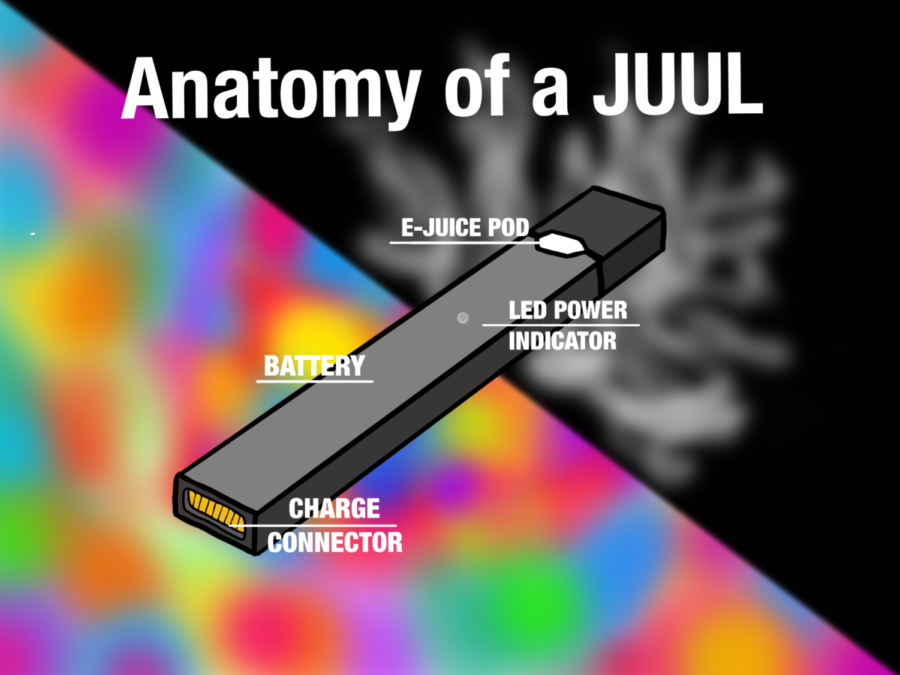Vaping Leads To A Spike In Teen Hospitalizations
October 2, 2019
In August, 15 teens in the mid-west were hospitalized for severe lung damage. Since then similar cases rose in the media causing national alarm as several of the cases cases have been tied to e-cigarettes. Almost all doctors involved in these cases confirmed that vaping was a major factor in patients’ hospitalizations. What first started as a trend in pop culture, has now become a hazardous habit leaving millions of young Americans hooked to nicotine.
Following the news of teen hospitalizations and deaths linked to vaping, the Trump administration along with the Food and Drug Administration quickly proposed a federal bill to ban flavored vaping liquid capsules in hopes of seeing a decrease in hospitalizations and alarming rates of teens using e-cigarettes.
Multiple states have swiftly enacted or proposed bills to deter teens from vape abuse. Michigan recently passed a state law that would ban flavored e-cigarettes prompting New York to propose similar efforts in prohibiting flavored e-cigarette sales. In August, Texas passed a law that raises the smoking age, for both tobacco cigarettes and e-cigarettes products, to 21.
Junior Amber Ruic doesn’t see much effectiveness behind these age restrictions because of how accessible these products are.
“Some gas stations don’t care about age restrictions, so [teens] can go there and buy JUUL [capsules],” Ruic said. “Some are sold online and can be ordered there, or older siblings and friends buy it for them.”
The new bans had mixed responses with some questioning the effectiveness of the bans but more widely, questioning why vaping is so harmful.
Vaping is the inhaling of vapor created by an e-cigarette, a battery-powered device, with capsules of liquid that contain nicotine or marijuana and often flavoring. JUUL, a flash drive-like e-cigarette, is commonly used among teens. A JUUL can be charged in a laptop USB port and produces less smoke than other cigarettes, allowing teens to smoke discreetly at school or home. In past years, vaping products were initially marketed towards tobacco smokers to slowly quit traditional smoking. However, the FDA has found no e-cigarettes to effectively do so.
Nevertheless, many teens and adults alike have misconceptions surrounding the real effects of vaping. A report done by John Hopkins Medicine found that although vaping is less harmful than traditional smoking, it still poses a threat to teens health. The nicotine is still a toxic substance that raises blood pressure and heart rate, which can lead to heart attacks.
HST teacher Doctor Kevin Hunter believes that e-cigarette use is specifically dangerous to teens’ developing brains.
“[Vaping] causes highly addictive behavior,” Hunter said. “When the frontal lobes aren’t fully formed yet it can easily start habits on teens.”
Hunter sees this effect most often in students’ performance at school.
“In school, students try to find a way out of the classroom to go and vape,” Hunter said. “I see students agitated and irritated waiting for the next time they can vape and looking for an excuse to get out of the classroom, to any place they can go to take another hit.”
Hunter believes that the appealing tastes, like fruity flavors, and harmless look of an e-cigarette target many teens without them taking in account of the health implications.
“Vaping looks so benign because it has a nice smell to it, and it seems like it’s not gonna really hurt you,” Hunter said. “You look at a cigarette and you look at a vape pen, and it seems so much less harmful on the surface, but the problem is what’s inside of it and what’s lurking underneath. We don’t have enough research done and anyone can put anything in liquid.”
With social scenes filled with teens using vape pens, Ruic believes many cases of addiction start with peer pressure at these hangouts.
“I think that the people I know who vape started vaping because they thought it was cool, kind of like how everyone got into smoking weed because they thought it was cool,” Ruic said. “Soon enough they got an addiction to nicotine, and now they can’t stop.”
With all the national attention vaping has stirred up, it may seem like an issue that doesn’t impact you or your peers. However, last week a survey published on Raider Echo found that out of 40 students, 12 have vaped before.
Moreover, Ruic sees the addiction in her classrooms with her peers.
“I understand it’s funny when someone pulls out a vape in class and blow it into their backpack but now it’s kind of sad because you’re so addicted to it that you have to do it at the school,” Ruic said. “It’s really sad ‘cause they are addicted to nicotine, and they’re not even 18 yet.”
This issue is also very personal for Ruic, who saw how the nicotine addiction had a negative impact on her past relationship.
“My ex-boyfriend would get mad when he couldn’t vape and very irritable,” Ruic said. “He would spend so much money on it or get mad when he didn’t have it, and now I don’t think it’s cool anymore because you notice it starting to become a problem.”
In light of rising criticisms of the brands marketing towards teens, CEO of JUUL, Kevin Burns, announced his resignation earlier today.



